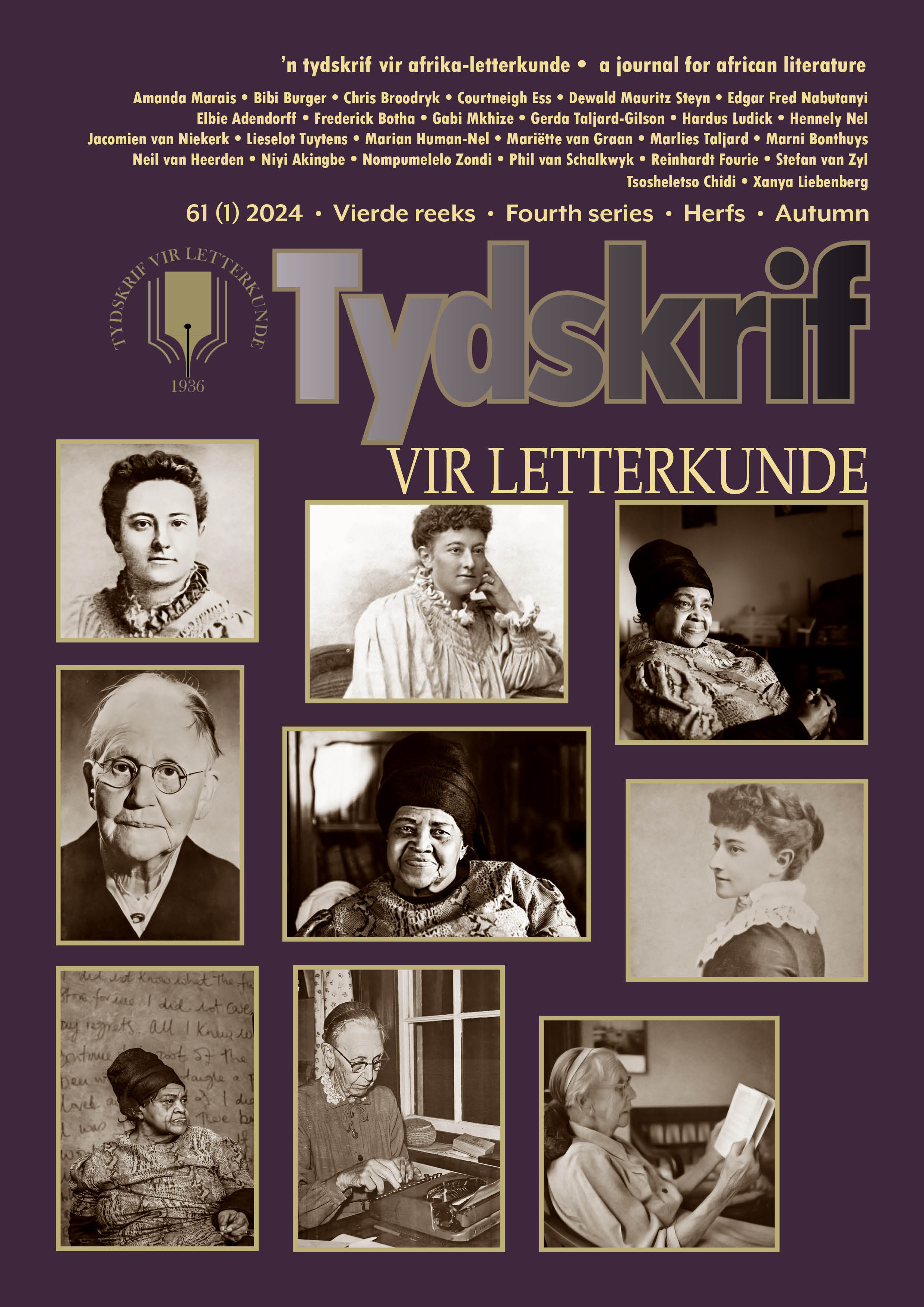Innovative register and feminist critique in Mark Behr’s The Smell of Apples
DOI:
https://doi.org/10.17159/tl.v61i1.16066Keywords:
Afrikaner, feminist critique, innovative registers, patriarchy, apartheid, class, raceAbstract
Mark Behr’s artistic exploration of the horrific legacy of Afrikaner racist and masculinist ideology in The Smell of Apples has attracted substantial critical attention. This is perhaps what has elevated his novel to a post-apartheid South African literary canon. While it has been read as an exculpatory narrative—an exploration of how white South Africans disclosed their complicity in apartheid’s atrocities and/or a disclosure of how the apartheid system violated their rights—there is critical blindness to other important themes that the novel grapples with. This is why I offer a limited reading of Behr’s critique of Afrikaner gender oppression. My exploration, which focuses on Behr’s exposition of gender discrimination of upper-middle class women in an Afrikaner society, is anchored on two questions: how does Behr deploy an innovative register—eavesdropping child witness-narrator and a written letter—to unveil the oppression of upper-middle class white South African women in the Afrikaner polity? Second, how does he script the feminist agency of the ‘mother of the nation’ figure who is muzzled by Afrikaner patriarchy? I foreground Maria Pia Lara’s thinking about the liberational potential of literary texts in my discussion of Behr’s exposition of the gendered oppression of certain categories of women by Afrikaner patriarchy.
Downloads
References
Barnard, Rita. “The Smell of Apples, Moby-Dick, and Apartheid Ideology.” Modern Fiction Studies vol. 46, no.1, 2000, pp. 207–26. DOI: https://doi.org/10.1353/mfs.2000.0001. DOI: https://doi.org/10.1353/mfs.2000.0001
Behr, Mark. “Living in the Fault Lines.” Security Dialogue vol. 28, no. 1, 1997, pp.115–22. DOI: https://doi.org/10.1177/0967010697028001011. DOI: https://doi.org/10.1177/0967010697028001011
Behr, Mark. The Smell of Apples. Abacus, 1995.
Butler, Judith. Frames of War: When is Life Grievable. Verso, 2009.
Coetzee, Azille. “Afrikaner Nationalism and the Light Side of the Colonial/Modern Gender System: Understanding White Patriarchy as Colonial Race Technology.” Feminist Review vol. 129, no. 1, 2021, pp. 93–108. DOI: https://doi.org/10.1177/01417789211041677. DOI: https://doi.org/10.1177/01417789211041677
Foucault, Michel. The Birth of Biopolitics: Lectures at the College de France (1978–1979), edited by Michel Sinellart. Translated by Graham Burchell. Palgrave Macmillan, 2008.
Heyns, Michiel. “Fathers and Sons: Structures of Erotic Patriarchy in Afrikaans Writing of the Emergency.” ARIEL: A Review of International English Literature vol. 27, no.1, 1996, pp. 81–104.
Heyns, Michiel. “The Whole Country’s Truth: Confession and Narrative in Recent White South African Writing.” Modern Fiction Studies vol. 46, no. 1, 2000, pp. 42–66. DOI: https://doi.org/10.1353/mfs.2000.0005. DOI: https://doi.org/10.1353/mfs.2000.0005
Medalie, David. “Old Scars, Old Bones, and Old Secrets: Three Recent South African Novels.” Journal of Southern African Studies vol. 23, no. 3, 1997, pp. 507–14. DOI: https://doi.org/10.1080/03057079708708553. DOI: https://doi.org/10.1080/03057079708708553
Ndebele, Njabulo. “Memory, Metaphor, and the Triumph of Narrative.” Negotiating the Past: The Making of Memory in South Africa, edited by Sarah Nuttall & Carli Coetzee. Oxford U P, 1997, pp. 9–28.
Ndebele, Njabulo. “Rediscovery of the Ordinary. Essays on South African Literature and Culture.” Journal of Southern African Studies vol. 12, no. 2, 1986, pp. 143–57. https://www.jstor.org/stable/2636740. DOI: https://doi.org/10.1080/03057078608708118
Nuttall, Sarah. “Telling ‘Free’ Stories? Memory and Democracy in South African Autobiography since 1994.” Negotiating the Past: The Making of Memory in South Africa, edited Sarah Nuttall & Carli Coetzee. Oxford U P, 1998, pp. 70–86.
Rajiva, Jay. “The Seduction of Narration in Mark Behr’s The Smell of Apples.” Research in African Literatures, vol. 44, no. 4, 2013, pp. 82–98. DOI: https://doi.org/10.2979/reseafrilite.44.4.82. DOI: https://doi.org/10.2979/reseafrilite.44.4.82
Robbins, Ruth. “American Feminism: Images of Women and Gynocriticism.” Modern North American Criticism and Theory: A Critical Guide, edited by Julian Wolfreys. Edinburgh U P, 2006, pp. 70–8. DOI: https://doi.org/10.1515/9780748626786-012
Robbins, Ruth. “Feminist Approaches.” Literary Theories, edited by Julian Wolfreys & William Baker. Macmillan, 1998, pp. 103–26.
Robbins, Ruth. Literary Feminisms. St Martin, 2000. DOI: https://doi.org/10.1007/978-1-137-15432-3
Roux, Daniel. “A Post-apartheid Canon?” Pretexts: Literary and Cultural Studies vol. 9, no. 2, 2000, pp. 243–6. DOI: https://doi.org/10.1080/713692719. DOI: https://doi.org/10.1080/713692719
Saayman Hattingh, Heidi, Nicole Jordan & Inge Economou. “Visualising feminine Afrikaner identity: past and present.” South African Journal of Art History vol. 35, no. 2, 2020, pp. 102–20.
Stobie, Cheryl. “Fissures in Apartheid’s ‘Eden’: Representations of Bisexuality in The Smell of Apples by Mark Behr.” Research in African Literatures vol. 39, no. 1, 2008, pp. 70–86. https://www.jstor.org/stable/20109560. DOI: https://doi.org/10.2979/RAL.2008.39.1.70
Downloads
Published
Issue
Section
License
Copyright (c) 2024 Tydskrif vir Letterkunde

This work is licensed under a Creative Commons Attribution-ShareAlike 4.0 International License.


 https://orcid.org/0000-0001-6465-6584
https://orcid.org/0000-0001-6465-6584


.png)